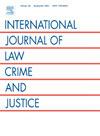The Neighbourhood Justice Centre in Australia: Exploring staff perceptions of their roles
IF 1.4
4区 社会学
Q3 CRIMINOLOGY & PENOLOGY
International Journal of Law Crime and Justice
Pub Date : 2025-05-29
DOI:10.1016/j.ijlcj.2025.100754
引用次数: 0
Abstract
Community Justice Centres (CJCs) provide an innovative problem-solving court model that aims to address the root causes of offending. The Neighbourhood Justice Centre (NJC) in Melbourne, Australia, is an example of a CJC that subscribes to the principle of community justice. This article is based on a study conducted in Melbourne, Australia, and explores staff perceptions of the NJC and their roles within it. The findings presented in this article stem from semi-structured interviews conducted with eleven current and former NJC staff members.
The key findings of this study suggests that the principle of community justice guides the operation of the NJC and is evident in the overall culture of the centre. Staff place an emphasis on having shared values and placing the ‘community’ element of the centre before the ‘justice’ element when fulfilling their roles. In addition, the staff of the centre highlight the importance of relationship-building and collaboration with each other, clients, and the community as a whole. Ultimately, the staff of the centre must also be advocates of the NJC for it to have longevity as a model.
The findings of this study indicate that recruiting staff with certain values and skills is imperative to preserve the NJC's commitment to community justice. Without this commitment, the centre deviates from its overall purpose, and also risks losing its legitimacy within the established criminal justice system.
澳大利亚邻里司法中心:探索工作人员对其角色的看法
社区司法中心(CJCs)提供一种创新的解决问题的法庭模式,旨在解决犯罪的根本原因。澳大利亚墨尔本的邻里司法中心(NJC)就是一个支持社区司法原则的邻里司法中心的例子。本文基于在澳大利亚墨尔本进行的一项研究,探讨了工作人员对国家标准委员会及其在其中的角色的看法。本文中的发现源于对11位现任和前任国家标准委员会工作人员进行的半结构化访谈。本研究的主要发现表明,社区正义原则指导着国家司法中心的运作,并在该中心的整体文化中表现得很明显。员工在履行自己的职责时,强调拥有共同的价值观,并将中心的“社区”元素置于“正义”元素之前。此外,中心的工作人员强调与彼此、客户和整个社区建立关系和合作的重要性。最终,该中心的工作人员也必须是国家癌症中心的倡导者,以使其成为一个长寿的典范。本研究的结果表明,招聘具有一定价值观和技能的员工是维护国家司法委员会对社区正义的承诺的必要条件。如果没有这一承诺,该中心就会偏离其总体目的,并有可能失去其在现有刑事司法制度内的合法性。
本文章由计算机程序翻译,如有差异,请以英文原文为准。
求助全文
约1分钟内获得全文
求助全文
来源期刊
CiteScore
2.70
自引率
0.00%
发文量
25
审稿时长
47 days
期刊介绍:
The International Journal of Law, Crime and Justice is an international and fully peer reviewed journal which welcomes high quality, theoretically informed papers on a wide range of fields linked to criminological research and analysis. It invites submissions relating to: Studies of crime and interpretations of forms and dimensions of criminality; Analyses of criminological debates and contested theoretical frameworks of criminological analysis; Research and analysis of criminal justice and penal policy and practices; Research and analysis of policing policies and policing forms and practices. We particularly welcome submissions relating to more recent and emerging areas of criminological enquiry including cyber-enabled crime, fraud-related crime, terrorism and hate crime.

 求助内容:
求助内容: 应助结果提醒方式:
应助结果提醒方式:


